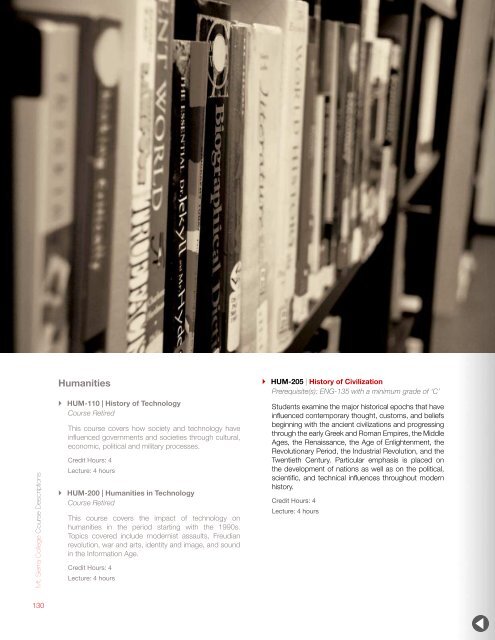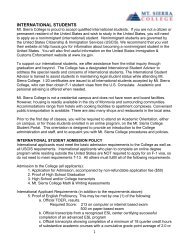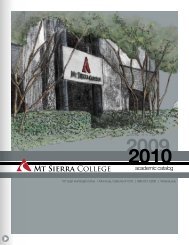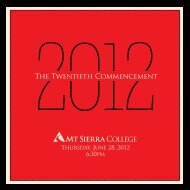Academic Catalog - Mt. Sierra College
Academic Catalog - Mt. Sierra College
Academic Catalog - Mt. Sierra College
Create successful ePaper yourself
Turn your PDF publications into a flip-book with our unique Google optimized e-Paper software.
<strong>Mt</strong>. <strong>Sierra</strong> <strong>College</strong> Course Descriptions<br />
130<br />
Humanities<br />
` HUM-110 | History of Technology<br />
Course Retired<br />
This course covers how society and technology have<br />
influenced governments and societies through cultural,<br />
economic, political and military processes.<br />
Credit Hours: 4<br />
Lecture: 4 hours<br />
` HUM-200 | Humanities in Technology<br />
Course Retired<br />
This course covers the impact of technology on<br />
humanities in the period starting with the 1990s.<br />
Topics covered include modernist assaults, Freudian<br />
revolution, war and arts, identity and image, and sound<br />
in the Information Age.<br />
Credit Hours: 4<br />
Lecture: 4 hours<br />
` HUM-205 | History of Civilization<br />
Prerequisite(s): ENG-135 with a minimum grade of ‘C’<br />
Students examine the major historical epochs that have<br />
influenced contemporary thought, customs, and beliefs<br />
beginning with the ancient civilizations and progressing<br />
through the early Greek and Roman Empires, the Middle<br />
Ages, the Renaissance, the Age of Enlightenment, the<br />
Revolutionary Period, the Industrial Revolution, and the<br />
Twentieth Century. Particular emphasis is placed on<br />
the development of nations as well as on the political,<br />
scientific, and technical influences throughout modern<br />
history.<br />
Credit Hours: 4<br />
Lecture: 4 hours<br />
` HUM-235 | Art History<br />
Prerequisite(s): PDT-315; ENG-155 with a minimum<br />
grade of ‘C’<br />
This course surveys the concepts and major art<br />
epochs beginning with ancient civilizations and<br />
continuing through the Golden Ages of Greece and<br />
Rome, the Middle Ages, the Renaissance, the New-<br />
Classical Period, the Romantic Period, and the modern<br />
movements of realism, impressionism, expressionism,<br />
cubism, surrealism, and abstraction. Sculpture and<br />
architecture are also examined as they reflect dynamic<br />
cultural patterns. Particular emphasis is placed on the<br />
evolution of pictorial composition.<br />
Credit Hours: 4<br />
Lecture: 4 hours<br />
` HUM-240 | History of Graphic Design<br />
Prerequisite(s): DES-100; ENG-135 with a minimum<br />
grade of ‘C’<br />
This course is an overview of visual communications<br />
from prehistory to the present day graphic design.<br />
Examining and discussing many periods, movements<br />
and styles through various examples of significant<br />
individuals and cultural groups, will view the sequential<br />
chronology of design within a more defined sociopolitical/historic<br />
context, providing students with better<br />
insight into the relevancy of their own work within their<br />
own time. Students also produce researched design<br />
projects to help reinforce this process of understanding.<br />
Credit Hours: 4<br />
Lecture: 4 hours<br />
` HUM-350 | Acting for Animators<br />
Prerequisite(s): ENG-260<br />
This course introduces students to acting theory by<br />
exploring the link between thinking and physical action,<br />
and between emotion and its expression. Topics critical<br />
to character design and animations development such<br />
as movement and body language, power centers,<br />
using psychological gestures, scene development, and<br />
knowing the audience are explored. In addition, the<br />
subjects of character analysis and acting principles as<br />
applied to an animator are covered.<br />
Credit Hours: 4<br />
Lecture: 4 hours<br />
Information Technology<br />
Management<br />
` ITM-420 | Operations Research & Implementation<br />
Course retired. Please see MGT-420.<br />
This course is designed to meet the needs of beginning<br />
through advanced students, and provides a balanced<br />
coverage of the theory, applications, and computations<br />
of operations research techniques – with a focus<br />
on deterministic models, probabilistic models, and<br />
nonlinear models.<br />
Credit Hours: 4<br />
Lecture: 4 hours<br />
` ITM-430 | Quantitative Management<br />
Course retired. Please see MGT-430.<br />
This course covers different theories of quantitative<br />
management and decision theory, forecasting, and<br />
game theory for decision-making processes.<br />
Credit Hours: 4<br />
Lecture: 4 hours<br />
` ITM-450 | Knowledge Management<br />
Course Retired<br />
This course covers the creation, transfer, sharing, and<br />
management of knowledge that is vital to business and<br />
technology decision making processes.<br />
Credit Hours: 4<br />
Lecture: 4 hours<br />
Internship<br />
` INT-xxx<br />
Prerequisite(s): Approval of the <strong>Academic</strong> Dean and<br />
Departmental Chair<br />
Open to students in good standing in their tenth term<br />
or higher.<br />
Under the supervision of a Instructor, the student will<br />
serve as an intern at a business or community-based<br />
organization related to his or her field of study. The<br />
student will have the opportunity to perform tasks and<br />
complete projects that synthesize the various skills<br />
learned within the degree program in a real world<br />
environment. Credits awarded depend upon nature of<br />
the internship and the total hours of the assignment.<br />
Students may complete two internships for credit,<br />
and must enroll in the internship prior to beginning the<br />
internship.<br />
Maximum credits granted per internship: 2 credit hours<br />
<strong>Mt</strong>. <strong>Sierra</strong> <strong>College</strong> Course Descriptions<br />
131







